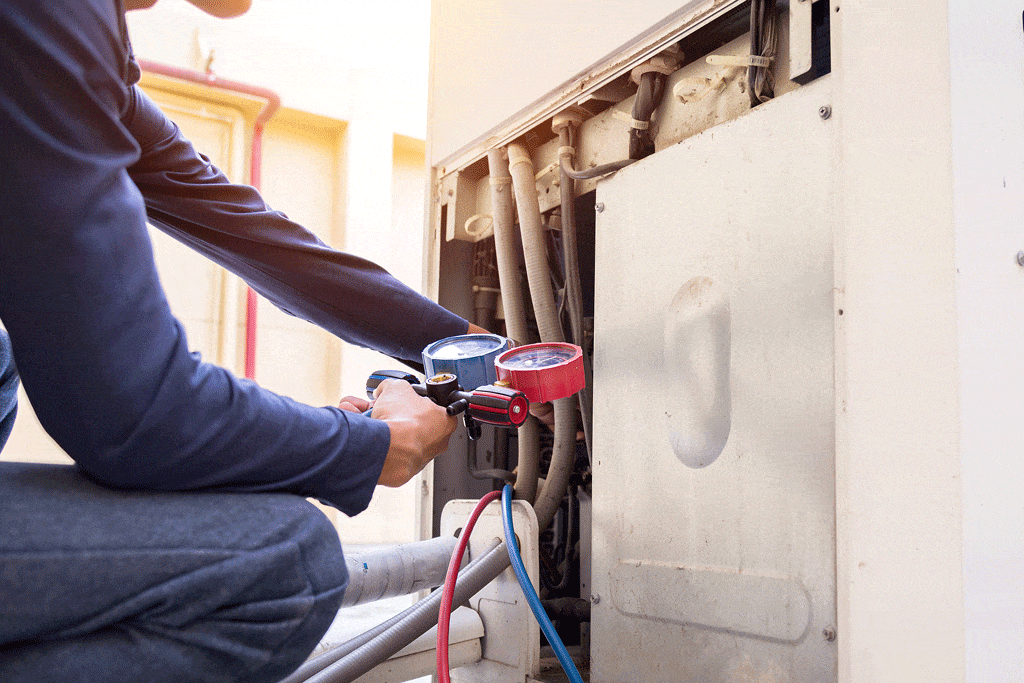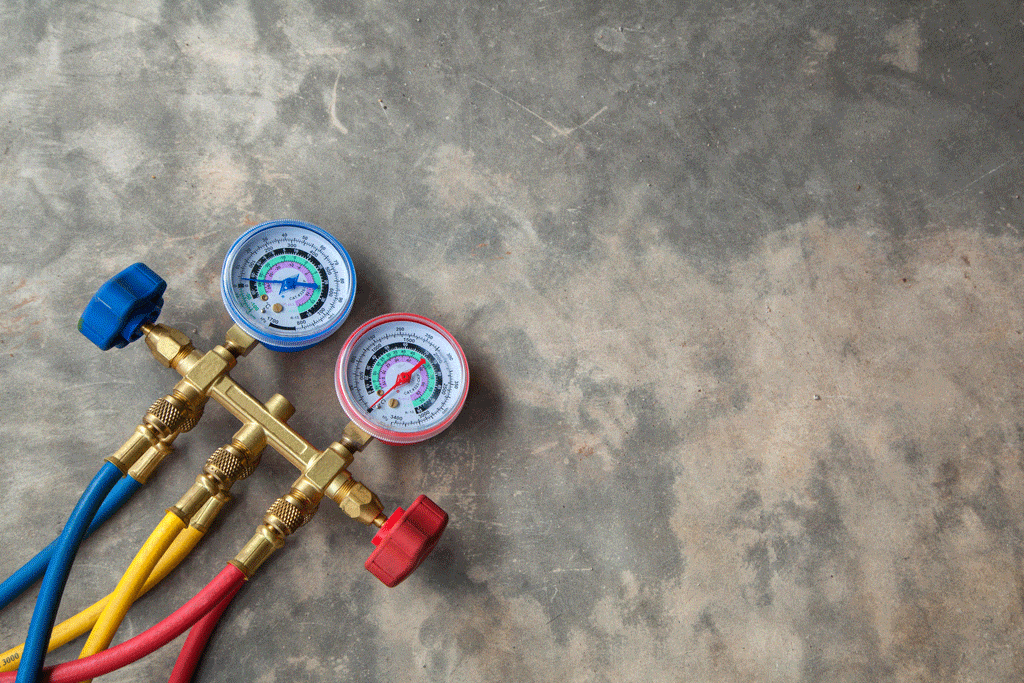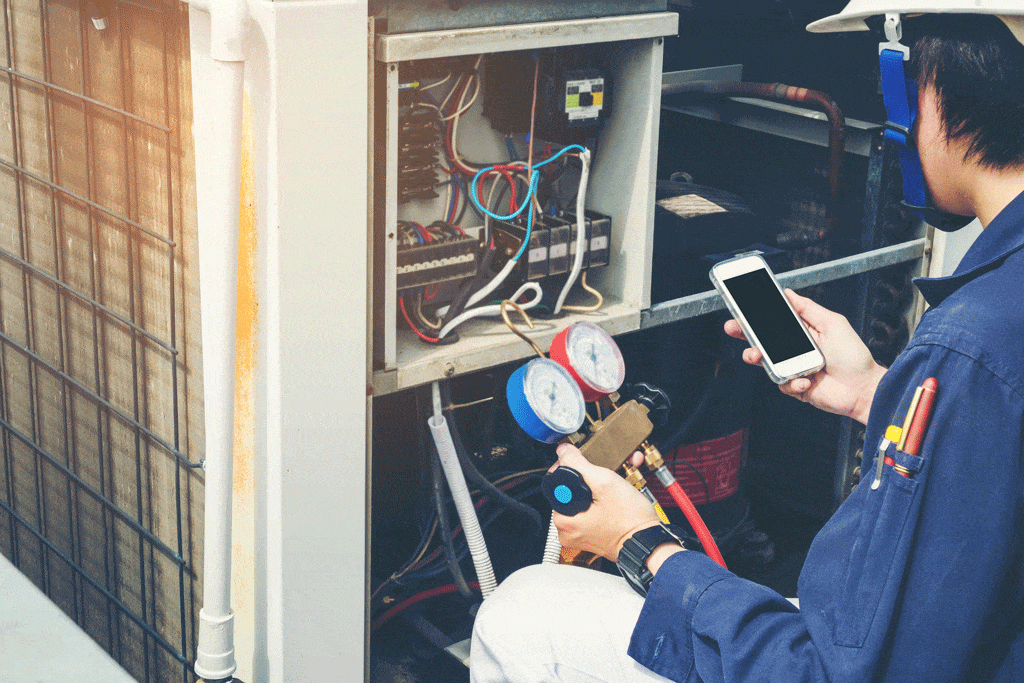
Air Conditioning Repair: Your Comprehensive Guide to Staying Chill
Air conditioning repair is a topic many homeowners find themselves diving into, especially when the heat is on.
Ever found yourself sweating in the middle of summer because your air conditioner decided to take a break?
You’re not alone.
In this blog article, we’ll unpack everything about air conditioning repair. From understanding the basics to troubleshooting common problems, we’ve got you covered.
What is Air Conditioning Repair?
Air conditioning repair is a specialized service that focuses on identifying, diagnosing, and rectifying issues within an air conditioner.
Just like any other machine, an AC unit comprises various components that work in tandem to regulate and circulate cool air throughout your living space.
Over time, due to wear and tear, external factors, or internal malfunctions, these components might not function optimally.
This is where air conditioning repair steps in.
The process begins with a thorough assessment of the system, identifying any anomalies or malfunctions. Technicians use specialized tools and their expertise to pinpoint the root cause of the problem.
Once diagnosed, they undertake the necessary repairs, which could range from simple tasks like cleaning filters or recalibrating thermostats to more complex ones like replacing faulty compressors or addressing refrigerant leaks.
The primary goal of air conditioning service and repair is to restore the system to its optimal functioning state. This not only ensures that you enjoy a consistent flow of cool air but also that the unit operates efficiently, conserving energy and reducing utility bills.
In essence, air conditioning repair is the key to maintaining the longevity of your AC system and ensuring a comfortable environment in your home.
The Evolution of Air Conditioning Systems
The journey of air conditioning repair and maintenance has evolved significantly over the years, parallel to the advancements in the design and technology of air conditioning systems themselves. The history of air conditioning is a testament to human ingenuity and the relentless pursuit of comfort.
In the early days, the concept of cooling spaces was rudimentary, relying on simple methods like using large ice blocks or employing fans. However, as technology progressed, so did the methods of cooling.
The modern air conditioner, as we know it today, was born out of a need to control humidity in printing plants. This invention not only revolutionized the printing industry but also paved the way for the widespread use of air conditioners in homes and businesses.
Today’s air conditioning systems are marvels of engineering, designed to be energy-efficient, environmentally friendly, and smart-home compatible.
With the integration of AI and IoT, modern AC units can self-diagnose issues, optimize cooling based on room occupancy, and even be controlled remotely via smartphones.
This evolution has, in turn, influenced the realm of air conditioning repair. Technicians now need to be well-versed with software diagnostics, firmware updates, and smart system integrations, in addition to the traditional mechanical repairs.
Furthermore, the push towards sustainability has led to the development of air conditioners that use eco-friendly refrigerants and have minimal carbon footprints.
This green shift is not just a trend but a necessity, given the global emphasis on reducing energy consumption and combating climate change.
Photo By I AM NIKOM at Shutterstock
A Deep Dive into Air Conditioning Repair Processes
Air conditioning systems, while robust, are not immune to wear and tear. Over time, various components can malfunction, making air conditioning repair an essential aspect of home maintenance.
Understanding the mechanics of air conditioning repair starts with grasping the fundamental science behind air conditioning systems.
These marvels of modern engineering have transformed our lives, especially during the sweltering summer months. Here’s a breakdown of how they work:
Basic Principle
At its very essence, an air conditioner’s primary function is to take in warm air from your living space and replace it with cooler air.
This simple yet effective process is what keeps our homes comfortable, especially during those hot summer days.
Evaporation and Condensation
The cooling process hinges on two primary phases – evaporation and condensation. When the refrigerant evaporates, it absorbs heat, and when it condenses, it releases that heat outside your home.
Role of the Refrigerant
The refrigerant is the heart and soul of the air conditioning system.
This chemical compound circulates within the AC unit, transitioning between gas and liquid states. Its primary role is to absorb heat from the indoor air and release it outside, thus cooling the interior of your home.
The Compressor
Think of the compressor as the ‘engine’ of your air conditioner.
Located in the outdoor unit, it compresses the refrigerant gas, raising its temperature and pressure. This high-energy gas then moves to the condenser.
The Condenser
Situated in the outdoor unit alongside the compressor, the condenser plays a pivotal role in the cooling process. Here, the high-energy gas from the compressor releases its heat to the outside air, turning back into a cooler liquid form.
Expansion Valve
This component regulates the flow of the liquid refrigerant into the evaporator. As the refrigerant passes through the valve, its pressure drops, and it begins to evaporate into a gas.
The Evaporator
Located in the indoor unit, the evaporator is where the magic happens. As the refrigerant evaporates, it absorbs heat from the indoor air. This cooled air is then circulated back into your home, giving you relief from the heat.
The Cycle Continues
The refrigerant, now back in its gaseous state, returns to the compressor, and the cycle begins anew.
Understanding this science is crucial when considering air conditioning service or AC repair.
A malfunction in any of these components can affect the efficiency of your system. By keeping a tab on these processes and ensuring they run smoothly, you can ensure a longer lifespan for your air conditioner and fewer hiccups along the way.
Why Do Air Conditioners Break Down?
Air conditioners, like all machines, have a lifespan.
And while they’re designed to provide comfort for years, they aren’t immune to issues. If you’ve ever found yourself searching for air conditioning repair or AC service on a hot day, you know the importance of a well-functioning unit.
Let’s delve deeper into the common reasons why air conditioners might falter:
Age and Wear
Just like humans, as air conditioners age, they become more susceptible to problems. Older units, especially those that have been running for a decade or more, naturally have more wear and tear.
Components degrade, and the efficiency of the system can decrease, leading to potential breakdowns.
Maintenance Neglect
One of the primary culprits behind air conditioning service calls is the lack of regular maintenance. An AC unit is a complex machine with various components working in tandem. Skipping regular check-ups and maintenance can lead to minor issues escalating into major problems.
Filters get clogged, coils collect dirt, and without timely intervention, the system’s performance can plummet.
The Perils of Overuse
While it’s tempting to run your AC continuously during a heatwave, doing so can strain the system.
Overworking your air conditioner, especially without giving it adequate breaks, can lead to faster wear and potential malfunctions. It’s like running a marathon without any training; the system gets exhausted.
Electrical Complications
Air conditioners rely heavily on electrical components. From the thermostat to the compressor, various parts require electricity to function. Faulty wiring, short circuits, or even power surges can lead to system failures.
Regular inspections can help identify and rectify these issues before they escalate.
External Factors
Sometimes, external elements can contribute to an AC’s malfunction. This includes extreme weather conditions, physical damage to the outdoor unit, or even pests and rodents interfering with the wiring.
Refrigerant Issues
The refrigerant is the lifeblood of the air conditioning process. If there’s a leak or if the system is undercharged or overcharged, it can affect the AC’s cooling efficiency. Regular air conditioning repair can ensure the refrigerant levels are optimal.
Component Malfunctions
Individual components like capacitors, motors, or fans can malfunction over time. These air conditioning repair issues might arise due to manufacturing defects, age, or external factors.
Improper Installation
If an air conditioner isn’t installed correctly, it can lead to a host of problems. From inefficient cooling to frequent breakdowns, the importance of professional installation cannot be overstated.
Understanding these common reasons for breakdowns can help homeowners take proactive measures. Regular air conditioning service, timely AC repair, and a keen eye for potential air conditioning repair issues can ensure your unit serves you efficiently for years to come.
Common Air Conditioning Problems and Solutions
Every homeowner dreads the day their air conditioner starts acting up, especially during the peak of summer.
Being equipped with knowledge about air conditioning repair and understanding common AC problems can be a lifesaver.
Not only can you potentially troubleshoot minor air conditioning repair issues yourself, but you’ll also be better prepared to discuss the situation with professionals when seeking air conditioning repair service. Let’s explore some of the prevalent issues and their solutions:
Refrigerant Leaks
The refrigerant is the substance that your air conditioner uses to remove heat and humidity from the air in your home.
If your system starts to leak refrigerant, it can cause a myriad of problems:
Symptoms: Reduced cooling efficiency, ice formation on the coils, and a hissing sound from the unit.
Solution: If you suspect a refrigerant leak, it’s essential to contact a professional. They will locate and repair the leak and then charge the system with the correct amount of refrigerant.
Sensor Issues
Modern air conditioners come equipped with a thermostat sensor, typically located behind the control panel.
This sensor measures the temperature of the air coming into the evaporator coil:
Symptoms: If the sensor is knocked out of position, your AC may cycle constantly or behave unpredictably.
Solution: Carefully adjust the sensor’s position so that it’s near the coil but not touching it. If problems persist, consider seeking professional AC repair.
Drainage Complications
Air conditioners produce condensate, which needs to be drained away. Over time, the drain can become clogged, leading to potential air conditioning repair issues:
Symptoms: Water pooling around the indoor unit, reduced cooling efficiency, or signs of water damage on walls or ceilings.
Solution: Regularly check the condensate drain for clogs, especially during humid weather. If you notice a blockage, clear it out or contact a professional.
Filter Clogs
One of the most common yet overlooked problems is a clogged filter.
A dirty filter restricts airflow, reducing the system’s efficiency and potentially causing other air conditioning repair issues.
Symptoms: Reduced airflow, ice formation on the coils, and a noticeable decrease in cooling efficiency.
Solution: Regularly check and replace or clean the filters. This simple maintenance task can prevent a host of problems.
Electrical Malfunctions
Over time, the electrical connections in your AC can wear out, leading to potential malfunctions.
Symptoms: The system doesn’t start, frequent tripping of the circuit breaker, or erratic behavior.
Solution: Regular air conditioning repair can ensure all electrical connections are tight and components are functioning correctly.
Fan Problems
Your AC has two fans – one that blows indoor air over the unit’s evaporator coil to cool it and another that expels the heated air from the inside of your home to the outside via the condenser.
Symptoms: Reduced airflow, warm air being circulated, or unusual noises from the unit.
Solution: Depending on the air conditioning repair issue, solutions might range from lubricating the motor, replacing faulty fan blades, or even replacing the fan motor.
Frozen Evaporator Coils
These coils contain the refrigerant and are responsible for absorbing heat from the air, similar to how a sponge absorbs water.
Symptoms: Reduced cooling efficiency, ice formation on the coils, or water pooling around the indoor unit.
Solution: Ensure adequate airflow by replacing clogged filters, and if the problem persists, seek professional help.
By understanding these common problems and their solutions, homeowners can ensure their air conditioners function efficiently, providing comfort during those hot summer days.
The Importance of Regular Maintenance
Air conditioners, much like other intricate machines in our lives, require consistent attention and care.
Drawing a parallel to vehicles, just as you wouldn’t drive your car for years without an oil change or tire rotation, your AC too shouldn’t be neglected. Regular air conditioning repair service is paramount to ensure its longevity and optimal performance.
Let’s delve deeper into why routine maintenance is so crucial:
Optimal Performance
Over time, dust, debris, and other contaminants can accumulate in your system. Regular cleaning ensures that your AC operates at its peak efficiency. This not only provides better cooling but also consumes less energy, leading to reduced utility bills.
Preventing Costly Repairs
Think of maintenance as a proactive approach. By addressing minor air conditioning repair issues during routine check-ups, you can prevent them from escalating into significant problems that require expensive air conditioning repair.
Extending Lifespan
An AC unit is an investment, and like any investment, you’d want it to last. Regular maintenance can extend the life of your system, ensuring you get the most out of your investment.
Ensuring Air Quality
Your AC does more than just cool your home; it also plays a role in circulating air. A well-maintained system ensures that the air quality in your home remains high, free from contaminants and pollutants.
Efficient Refrigerant Levels
The refrigerant is the lifeblood of the cooling process. During maintenance, professionals can check if the refrigerant level is optimal, ensuring efficient cooling. Any leaks or air conditioning repair issues can be addressed promptly.
Safety First
Faulty wiring or malfunctioning components can pose safety risks. Regular air conditioning repair service can identify and rectify such air conditioning repair issues, ensuring the safety of your household.
Peace of Mind
Knowing that your AC is in top condition, especially as the summer months approach, offers peace of mind. You can be confident that your system will work when you need it the most.
Protecting Warranty
Many manufacturers require regular maintenance as a condition of the warranty. Neglecting this can void your warranty, leaving you without coverage should issues arise.
Incorporating regular maintenance into your home care routine is not just about preventing AC repair but also about ensuring comfort, safety, and efficiency.
After all, on a sweltering summer day, there’s nothing quite like the relief of a well-functioning air conditioner.
The Cost of Neglecting Repairs
In the realm of home maintenance, especially when it comes to air conditioning repair, the old adage “a stitch in time saves nine” rings particularly true.
When minor air conditioning repair issues with your air conditioner are overlooked or postponed, they can snowball into larger, more complex problems. This not only disrupts the comfort of your living space but can also hit your wallet hard.
Imagine a scenario where your AC starts making a slight humming noise. It might seem innocuous at first, something you can live with.
But this could be an early sign of a failing motor or another component issue. If left unchecked, this ‘minor’ problem could lead to the motor burning out, necessitating a costly replacement.
Moreover, when one component of the air conditioner is compromised, it often puts additional strain on other parts of the system. This domino effect can lead to a cascade of failures throughout the unit.
What could have been a simple air conditioning repair service or a minor part replacement can turn into a significant overhaul or, in worst-case scenarios, a complete system replacement.
Additionally, an inefficiently running AC consumes more energy. This means higher electricity bills, even if the cooling isn’t optimal.
Over time, these increased operational costs can add up, making the decision to delay repairs an even more expensive proposition.
In essence, while it might seem tempting to push off minor AC repair tasks to another day, the long-term implications of such decisions can be severe.
It’s always wise to address air conditioning repair issues head-on, ensuring that your air conditioner remains in top shape, providing efficient cooling without any unexpected and hefty repair bills.
Photo By Joyseulay at Shutterstock
Choosing the Right Repair Service
Selecting the right air conditioning repair service is paramount to ensuring your AC unit gets the best care possible. With numerous service providers in the market, making an informed choice can be daunting.
To simplify the process, here are key factors to consider:
Experience
The longevity of a service provider in the business speaks volumes.
A company that has been offering air conditioning service for years or even decades indicates a wealth of experience. They’ve likely encountered and resolved a myriad of air conditioning repair issues, making them well-equipped to handle your specific problem.
Reviews and Testimonials
In today’s digital age, customer reviews are invaluable. Platforms like Google, Yelp, and Better Business Bureau provide insights into other customers’ experiences with the service provider.
Positive reviews can attest to the company’s professionalism, punctuality, and quality of service. On the other hand, consistent negative feedback can be a red flag.
Certifications and Training
The world of AC repair is ever-evolving, with new technologies and methodologies emerging regularly.
A reputable service provider will ensure their technicians are up-to-date with the latest industry standards. Check if they have certifications from recognized institutions or if they’re authorized service providers for specific AC brands.
Transparency in Pricing
Nobody likes hidden costs. A trustworthy air conditioning service will provide transparent pricing, giving you a clear breakdown of costs before commencing work. This ensures there are no unpleasant surprises when the bill arrives.
Availability and Responsiveness
air conditioning repair issues can arise unexpectedly. It’s crucial to choose a service provider who can respond promptly, especially in emergency situations.
Check if they offer 24/7 services or how quickly they can schedule a visit.
Warranty and Guarantees
A confident service provider will stand by their work. Check if they offer warranties on their repairs or guarantees on parts replaced. This not only provides peace of mind but also indicates their commitment to quality.
Local Presence
A local air conditioning repair service will likely be more attuned to the specific needs and challenges of your area. They’ll be familiar with local climate conditions, common AC models in the region, and even specific challenges posed by local water or air quality.
Your AC unit is a significant investment, and it’s crucial to entrust its care to the right hands.
By considering the factors listed above, you can ensure you choose a service provider that aligns with your needs and ensures your AC’s longevity and optimal performance.
DIY vs. Professional Repair
In an era where DIY tutorials are just a YouTube search away, it’s tempting to tackle air conditioning repair tasks on your own.
While this approach can be satisfactory for minor air conditioning repair issues, it’s essential to weigh the pros and cons of DIY versus seeking professional air conditioning service.
Let’s delve into the intricacies of both approaches:
DIY Approach
Cost-Effective (Sometimes): One of the primary reasons homeowners lean towards DIY is the potential savings. By handling minor repairs yourself, you can avoid service fees and labor costs.
Immediate Solution: If you have the necessary tools and a bit of know-how, you can address the issue immediately without waiting for a technician’s availability.
Learning Experience: Tackling minor repairs can be a learning experience, giving you a better understanding of your AC system.
However, the DIY route has its pitfalls:
Potential for Error: Without professional training, there’s a risk of misdiagnosing the air conditioning repair issue or implementing an incorrect fix. This can lead to more significant problems down the line.
Safety Concerns: AC units involve electrical components. If not handled correctly, there’s a risk of electrical shocks or other hazards.
Voiding Warranty: Some manufacturers stipulate that repairs should be conducted by certified professionals. DIY fixes might void your warranty, leaving you without coverage for future issues.
Professional Repair
Expertise and Experience: Professionals bring years of experience and training to the table. They can diagnose air conditioning repair issues accurately and offer the most effective solutions.
Right Tools for the Job: Professionals are equipped with the necessary tools and parts to handle a wide range of AC repair tasks. This ensures the job is done efficiently and correctly.
Warranty and Guarantees: Reputable air conditioning service providers often offer warranties on their repairs, giving you peace of mind.
While the allure of DIY can be strong, especially for minor air conditioning repair issues, it’s crucial to recognize the limitations of this approach.
For more complex problems, the expertise, tools, and guarantees offered by professional service providers far outweigh the potential savings of a DIY fix.
Remember, your AC is a significant investment, and ensuring its optimal performance and longevity requires the right care and expertise.
Photo By Ground Picture at Shutterstock
Understanding Repair Costs
When your air conditioner starts showing signs of malfunction, one of the primary concerns that likely comes to mind is the potential repair cost.
Navigating the world of air conditioning repair costs can be daunting, especially with the myriad of factors that influence the final bill.
Let’s break down the elements that play a role in determining these costs and how you can approach them:
Factors Influencing Repair Costs
Nature of the Problem: Not all air conditioning repair issues are created equal. A simple filter replacement or thermostat recalibration will be considerably less expensive than replacing a compressor or fixing a refrigerant leak.
The complexity and severity of the issue play a significant role in the overall cost.
Parts Required: Some components of an air conditioner are pricier than others. For instance, if your repair involves replacing a major part like the condenser or the motor, it will naturally be more costly than replacing a capacitor or a fuse.
Service Provider’s Rates: Different air conditioning service providers have varying labor rates. This can be influenced by their experience, reputation, overhead costs, and even geographical location.
Age of the Unit: Older units might require parts that are harder to find or are no longer in production, potentially increasing the cost. Conversely, newer models might be under warranty, reducing the out-of-pocket expense.
Maintenance History: An AC unit that has been regularly serviced and well-maintained might incur lower repair costs compared to a neglected one. Regular maintenance can prevent major malfunctions and prolong the life of components.
Navigating Repair Costs
Detailed Quotes: Before committing to a repair, always ask for a detailed quote. This should break down the cost of parts, labor, and any additional fees. Having this in hand ensures transparency and prevents unexpected costs.
Comparative Analysis: It’s wise to get quotes from multiple air conditioning service providers. This not only gives you a ballpark figure of the expected cost but also allows you to gauge the reliability and reputation of different technicians.
Warranties and Guarantees: Check if any parts or services come with a warranty. This can be a sign of the service provider’s confidence in their work and can save costs in the long run if air conditioning repair issues arise post-repair.
Consider Long-Term Costs: Sometimes, the most cost-effective solution in the short term might not be the best long-term decision. For instance, continually repairing an old, inefficient unit might cost more over time than investing in a new, energy-efficient model.
Extending the Life of Your Air Conditioner
An air conditioner is more than just a luxury; for many, it’s a necessity, especially during those sweltering summer months.
Given the comfort and convenience it provides, ensuring its longevity is paramount. With the right care and attention, your AC unit can efficiently serve you for over a decade, if not longer.
Let’s explore some actionable steps you can take to prolong the life of your air conditioner and ensure consistent air conditioning service:
Regular Maintenance
Just like any other machine, your air conditioner thrives on regular check-ups.
An annual maintenance schedule allows professionals to inspect the unit, identify potential air conditioning repair issues, and address them before they escalate. This proactive approach not only extends the life of your AC but also ensures it runs at peak efficiency, saving on energy costs.
Clean Filters
The filters play a pivotal role in ensuring the air quality in your home and the efficiency of the AC unit.
Over time, they can accumulate dust, pollen, and other contaminants. Regularly cleaning or replacing these filters ensures optimal airflow and reduces the strain on the system. A clean filter can significantly improve the efficiency of the air conditioning service and reduce wear and tear on the unit.
Ensure Proper Installation
The foundation of a long-lasting air conditioner lies in its installation.
Ensuring your AC is installed correctly from the outset can prevent a host of air conditioning repair issues down the line. This includes ensuring proper leveling, adequate spacing for airflow, and correct electrical connections. If you’re unsure about the installation, consider consulting with a professional AC repair and installation service.
Mind the Thermostat
Consider investing in a programmable thermostat. This allows you to set the temperature to rise when you’re not home and cool down before you return.
Such practices reduce the continuous strain on the AC, extending its lifespan.
Protect the Outdoor Unit
The external component of your AC, usually the condenser, should be shielded from direct sunlight and debris.
Planting shrubs or installing a protective barrier (while ensuring adequate airflow) can help maintain its efficiency.
Avoid Overworking the System
On particularly hot days, it might be tempting to push your AC to its lowest settings. However, overworking the system can lead to faster wear and tear. Instead, use ceiling fans to circulate the cool air more effectively, reducing the load on the AC.
Check Refrigerant Levels
The refrigerant is crucial for the cooling process. Ensuring it’s at the optimal level and there are no leaks can significantly impact the efficiency and longevity of the system.
Seal Your Home
Ensure that doors, windows, and any other openings are sealed properly. This prevents the cool air from escaping and the hot air from entering, reducing the workload on your AC.
Stay Updated
Technology is ever-evolving. Stay updated with the latest in air conditioning repair and maintenance practices. Sometimes, simple tweaks or upgrades can significantly extend the life of your unit.
Educate Yourself
Understand the basics of how your AC works. This knowledge can help you identify potential air conditioning repair issues early on and take preventive measures.
The Environmental Impact of Air Conditioning Systems
As the global demand for air conditioning systems continues to rise, especially in rapidly developing regions, understanding the environmental implications becomes paramount.
Air conditioning repair and maintenance play a crucial role in this context, ensuring that these systems operate efficiently and have minimal adverse effects on the environment.
Air conditioners, while providing comfort, consume a significant amount of energy. This energy consumption, especially if sourced from non-renewable resources, contributes to greenhouse gas emissions.
An inefficient or malfunctioning AC unit can consume even more power, exacerbating its carbon footprint.
Regular air conditioning repair and service can help mitigate this by ensuring the system runs optimally, using the least amount of energy to provide the desired cooling.
Another environmental concern associated with air conditioning systems is the refrigerants they use. Historically, many AC units used refrigerants that, when released into the atmosphere, contributed to ozone layer depletion. Thanks to international agreements and advancements in technology, many of these harmful refrigerants are being phased out.
Modern air conditioning systems are transitioning to more environmentally friendly alternatives.
However, it’s essential that during air conditioning repair or service, technicians handle these substances responsibly, ensuring they don’t escape into the atmosphere.
Lastly, the production and disposal of AC units have environmental implications.
As consumers, opting for durable and high-quality systems that don’t need frequent replacements can reduce the environmental burden. When these units do reach the end of their life, proper recycling and disposal methods should be employed to minimize waste.
One Hour Air Conditioning & Heating of Dallas: Your Go-To Air Conditioning Repair Service
One Hour Air Conditioning & Heating of Dallas stands out when it comes to air conditioning repair.
With a stellar reputation and a team of seasoned professionals, they guarantee top-notch air conditioning repair service. Check out their reviews and ratings here.
Serving locations such as:
- Addison, TX
- Allen, TX
- Carrollton, TX
- Dallas, TX
- Frisco, TX
- Irving, TX
- Lewisville, TX
- McKinney, TX
- Plano, TX
- Richardson, TX
- The Colony, TX
For prompt service, call 469-598-0524.
Wrapping Up the Cool Journey
Navigating the world of air conditioning repair and understanding the intricacies of AC systems can seem like a daunting task.
However, as we’ve journeyed through the evolution, environmental implications, and the sheer importance of these cooling marvels, it’s evident that they’re more than just machines. They represent human ingenuity, our commitment to comfort, and our ever-evolving relationship with technology.
As we embrace the future, the emphasis on sustainable and efficient air conditioning service becomes even more paramount.
The blend of technology with eco-consciousness ensures that we not only enjoy the comforts of cool air but also tread lightly on our planet.
Whether it’s the advancements in green refrigerants, the integration of smart tech, or the simple act of regular maintenance, every step counts.
So, the next time you dial down the thermostat or call for an AC repair, remember the broader narrative. It’s not just about cooling spaces; it’s about crafting a sustainable, comfortable future for all.
Photo By Sergii Gnatiukna at Shutterstock
FAQs
- How often should I service my air conditioner?
It’s recommended to service your AC at least once a year, preferably before the summer season starts.
- Can I perform air conditioning repair myself?
While minor issues can be addressed with DIY methods, it’s best to consult a professional for more complex problems.
- How long do air conditioners typically last?
With proper maintenance, an air conditioner can last 10-15 years.
- What are the signs that my AC needs repair?
If your AC is making strange noises, not cooling properly, or emitting odd smells, it might need repair.
- How can I increase the lifespan of my AC?
Regular maintenance, cleaning, and timely repairs can help extend the life of your AC.
- Is it better to repair or replace my old AC?
It depends on the age of your AC and the nature of the problem. Sometimes, replacing can be more cost-effective in the long run.
- How can I reduce my AC’s energy consumption?
Ensure it’s running efficiently, set the thermostat wisely, and use ceiling fans to circulate air.
- What’s the best temperature setting for my AC?
It varies based on personal preference, but 78°F (25.5°C) is generally recommended when you’re at home.
- How do I know if my AC is low on refrigerant?
If your AC isn’t cooling as it should or is forming ice, it might be low on refrigerant.
- Can a dirty filter affect my AC’s performance?
Yes, a clogged filter can restrict airflow, reducing efficiency and increasing energy costs.
See our most recent blog on this topic here.
Check out our reviews here
Photo By A_stockphoto at Shutterstock









